Unit 8 Culture Shapes Us Lesson 45 Different Manners课件
文档属性
| 名称 | Unit 8 Culture Shapes Us Lesson 45 Different Manners课件 |  | |
| 格式 | zip | ||
| 文件大小 | 3.8MB | ||
| 资源类型 | 教案 | ||
| 版本资源 | 冀教版 | ||
| 科目 | 英语 | ||
| 更新时间 | 2018-04-20 16:56:45 | ||
图片预览

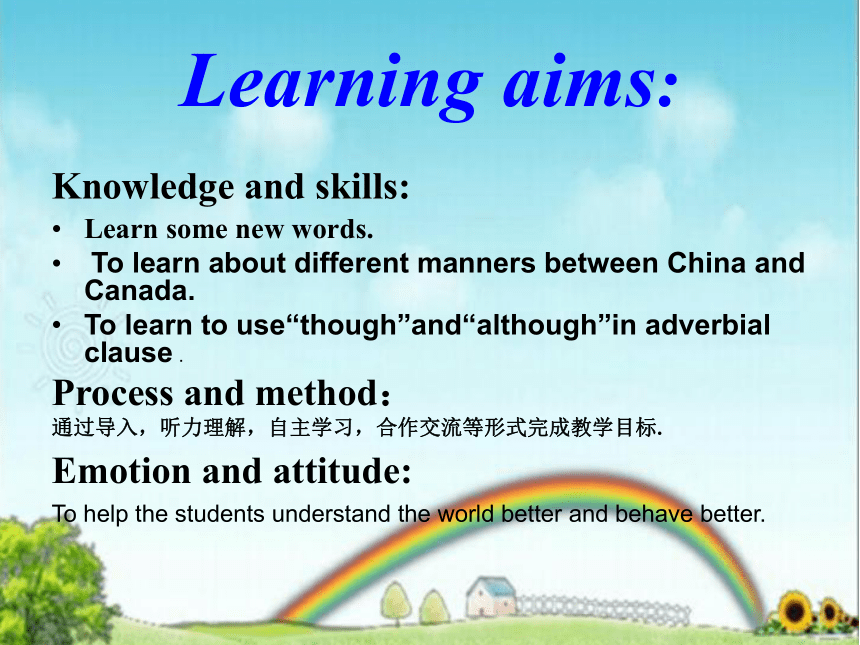
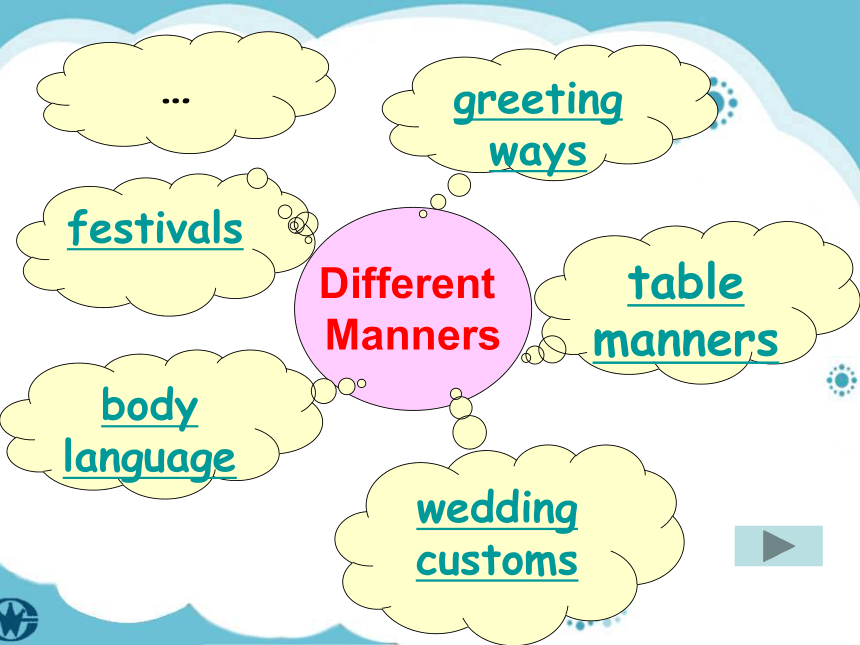
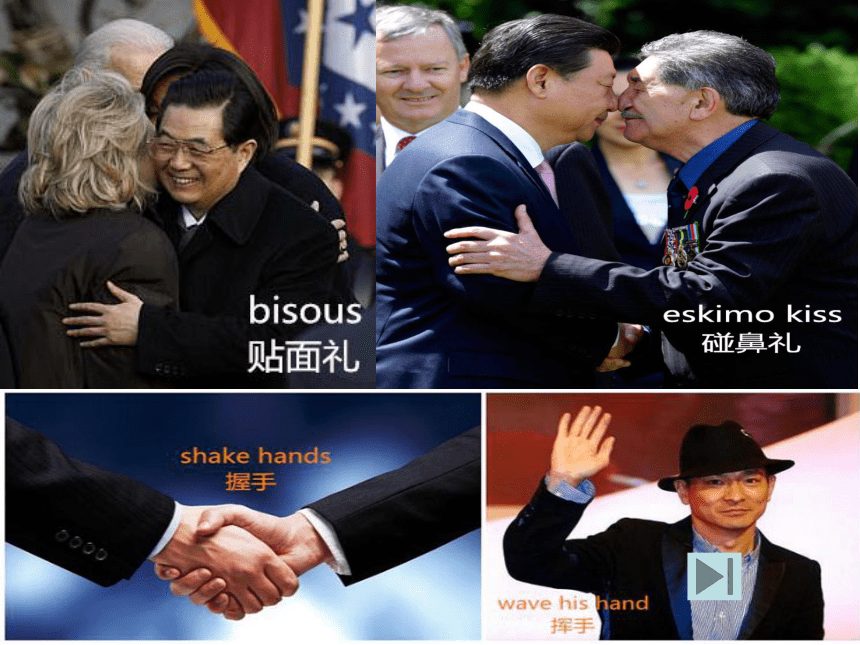
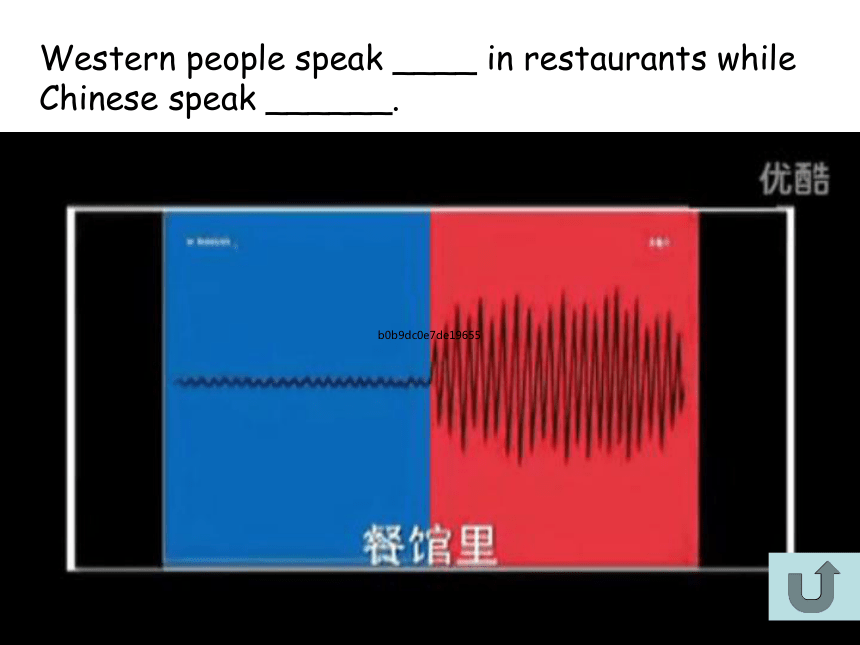
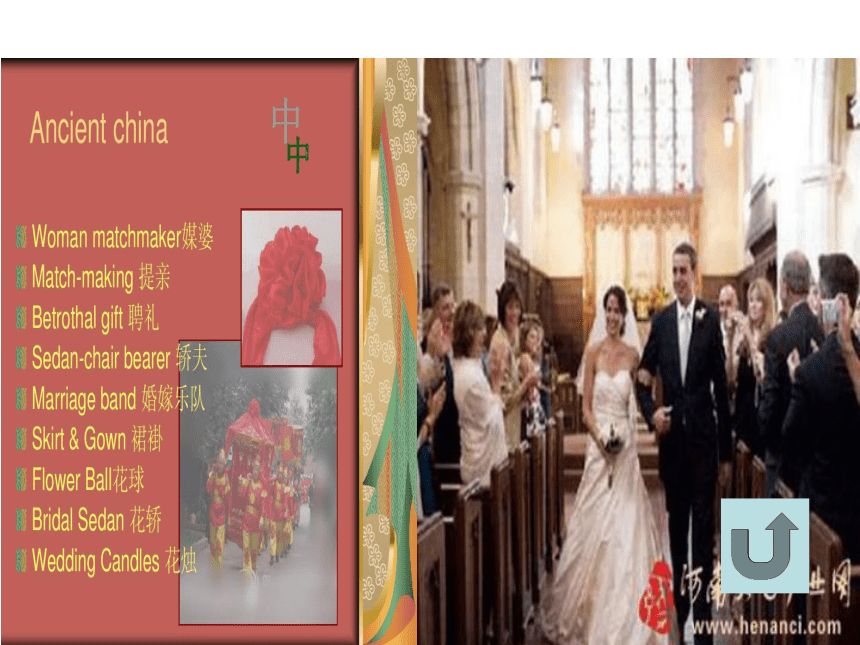
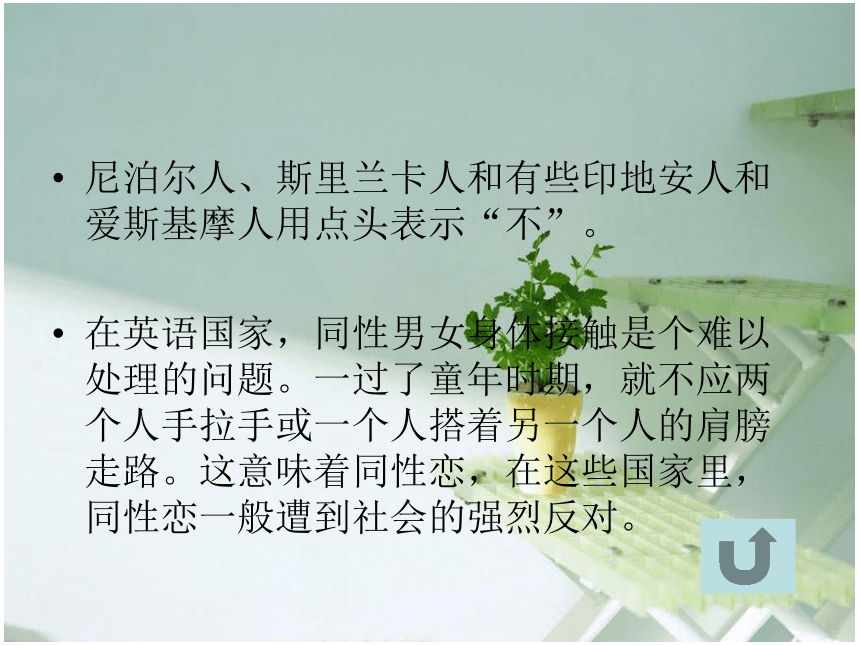
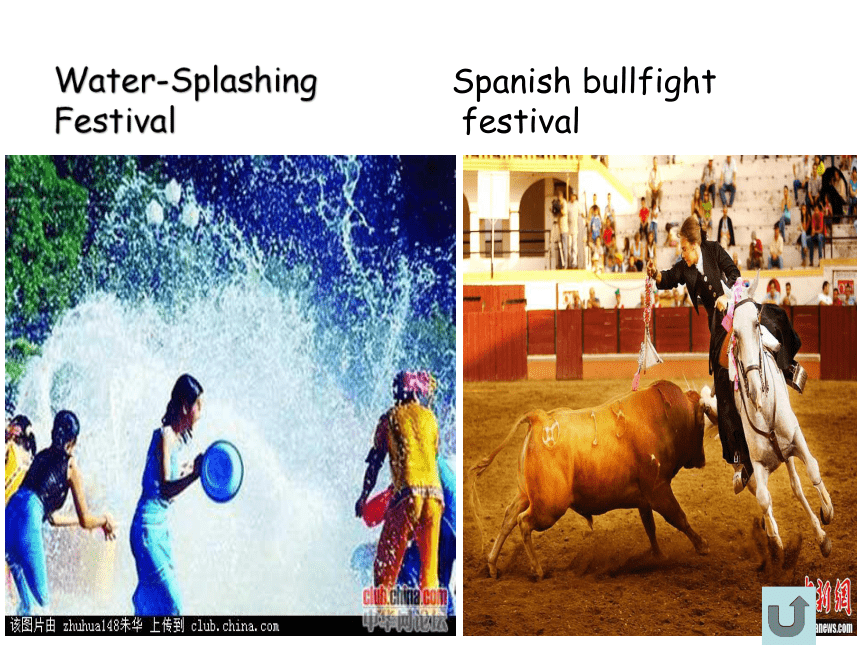
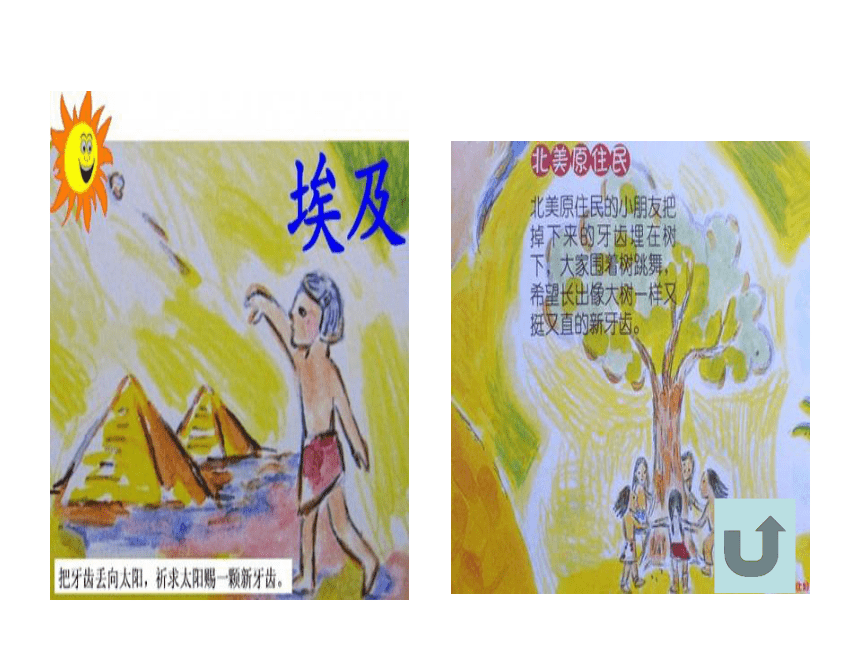
文档简介
课件21张PPT。Lesson45 Different Manners Learning aims:Knowledge and skills:
Learn some new words.
To learn about different manners between China and Canada.
To learn to use“though”and“although”in adverbial clause .
Process and method:
通过导入,听力理解,自主学习,合作交流等形式完成教学目标.
Emotion and attitude:
To help the students understand the world better and behave better.Different
Mannersgreeting waystable mannersfestivalswedding customs body language…Western people speak ____ in restaurants while Chinese speak ______.尼泊尔人、斯里兰卡人和有些印地安人和爱斯基摩人用点头表示“不”。
在英语国家,同性男女身体接触是个难以处理的问题。一过了童年时期,就不应两个人手拉手或一个人搭着另一个人的肩膀走路。这意味着同性恋,在这些国家里,同性恋一般遭到社会的强烈反对。?
Water-Splashing FestivalSpanish bullfight
festival Learn some new words:
1.manners ['m?n?s] n. 礼仪;习俗;礼貌;举止
2.though [e?u] conj. 虽然;尽管;即使;然而
3.modest [`m?d?st] adj. 谦虚的;谦恭的
4.virtue ['v?:t?u:] n. 美德
5. praise [pre?z] v/n. 称赞;赞扬
6. private ['pra?v?t] adj. 私人的;私有的
7. elderly [`eld?li] adj.上了年纪的;较老的
8. guest [ɡest] n. 客人
9. extra ['ekstr?] adj. 额外的;另外的
10. waiter n. 男服务员---waitress(女服务员)
11. tip v. 给小费 ----tipping
词汇运用检测:根据句意填空
1.Different countries have different m________.
2.She is a good student and her teacher often
_______(表扬) her.
3.You can’t ask others’ p______ things. It’s not
polite.
4.All the ____(guest) are here. Let’s begin the party at once now.
5.T____ we are tired, we still work hard.
annerspraisesguestshoughrivateUseful phrased:be different from __________
sound like _____________
feel embarrassed_____________
offer an elderly person a seat________
pay for sth______________
take turns doing sth_________
praise sb. for sth.___________
和…不同听起来像感到尴尬提供一个座位给老年人支付…轮流做某事因某事而赞扬某人Listen and fill in the blanks1.I have lived in Canada for __years.
2.But in North America,this is usually a sign of being weak and not ______.
3.It’s not ___ to ask an adult’s age.
4.In Canada,however,people often ___ the cost of a meal.
5.In China,people ___ give extra momey to waiters,waitress.23confidentpoliteshareseldom任务型阅读1.To ask an adult’s age is ______ in many places in China.
2.How many cultural differences are mentioned in the text?
3.Why does the writer call himself Joe Wu?
4.找出全文的主旨句。
5.翻译句子(文章最后一句话)。
I think understanding cultural differences really …
thahkscommonpolitepoliteembarrassedtake turnsharepolitepassseldomdone重难点知识点拨:
1.Though I have lived here for a long time, I still don’t feel Canadian.
1)though = although 尽管,然而 (引导让步状语从句,不能跟but ,however 同时连用。即:在同一个复合句中,用了though,就不能用but和however;反之,用了but和however, 就不能同时用though)
Eg. 【2014河北】Eric arrived on time, ______ it was the rush hour.? A. although?? B. because??? C. while????? D. unless? 2)此句还含有一个以for(或since)为标志的现在完成时态,表示一个动作发生在过去延续到现在,有可能继续持续下去。
【练习】Zhao Lan ______already ______in this school for two years 。
A. was ; studying B. will ; study
C. has ; studied D. are ; studying
【2016二模】He ______ painting for 5 years and he paints well.
A.Learn B.learns C.has learn D.will learn2.It’s interesting to experience two different cultures.
It is +adj. + to do sth. 干某事怎么样
eg.
It’s not polite to ask an adult’s age.
It’s polite to offer an elderly person a seat.
It’s polite to put food on their plates.
It is +adj. +for sb. + to do sth. 对某人来说干某事怎么样
【练习】It’s important for us ______(learn) English.
Sum up:课堂小结:
1.Words:
manners, though, modest, virtue ,praise,
private, elderly, guest, extra, , tip
2.Phrases:
be different from、 sound like 、feel embarrassed、 offer an elderly person a seat、
pay for sth、 take turns doing sth、 praise sb. for sth.
3.Key sentences:.
It’s interesting to experience two different cultures. It is +adj. + to do sth. 干某事怎么样
Homework:
1.Learn the new words and phrases by
heart and finish the exercises of L45 on Page119.
Thank you!
Learn some new words.
To learn about different manners between China and Canada.
To learn to use“though”and“although”in adverbial clause .
Process and method:
通过导入,听力理解,自主学习,合作交流等形式完成教学目标.
Emotion and attitude:
To help the students understand the world better and behave better.Different
Mannersgreeting waystable mannersfestivalswedding customs body language…Western people speak ____ in restaurants while Chinese speak ______.尼泊尔人、斯里兰卡人和有些印地安人和爱斯基摩人用点头表示“不”。
在英语国家,同性男女身体接触是个难以处理的问题。一过了童年时期,就不应两个人手拉手或一个人搭着另一个人的肩膀走路。这意味着同性恋,在这些国家里,同性恋一般遭到社会的强烈反对。?
Water-Splashing FestivalSpanish bullfight
festival Learn some new words:
1.manners ['m?n?s] n. 礼仪;习俗;礼貌;举止
2.though [e?u] conj. 虽然;尽管;即使;然而
3.modest [`m?d?st] adj. 谦虚的;谦恭的
4.virtue ['v?:t?u:] n. 美德
5. praise [pre?z] v/n. 称赞;赞扬
6. private ['pra?v?t] adj. 私人的;私有的
7. elderly [`eld?li] adj.上了年纪的;较老的
8. guest [ɡest] n. 客人
9. extra ['ekstr?] adj. 额外的;另外的
10. waiter n. 男服务员---waitress(女服务员)
11. tip v. 给小费 ----tipping
词汇运用检测:根据句意填空
1.Different countries have different m________.
2.She is a good student and her teacher often
_______(表扬) her.
3.You can’t ask others’ p______ things. It’s not
polite.
4.All the ____(guest) are here. Let’s begin the party at once now.
5.T____ we are tired, we still work hard.
annerspraisesguestshoughrivateUseful phrased:be different from __________
sound like _____________
feel embarrassed_____________
offer an elderly person a seat________
pay for sth______________
take turns doing sth_________
praise sb. for sth.___________
和…不同听起来像感到尴尬提供一个座位给老年人支付…轮流做某事因某事而赞扬某人Listen and fill in the blanks1.I have lived in Canada for __years.
2.But in North America,this is usually a sign of being weak and not ______.
3.It’s not ___ to ask an adult’s age.
4.In Canada,however,people often ___ the cost of a meal.
5.In China,people ___ give extra momey to waiters,waitress.23confidentpoliteshareseldom任务型阅读1.To ask an adult’s age is ______ in many places in China.
2.How many cultural differences are mentioned in the text?
3.Why does the writer call himself Joe Wu?
4.找出全文的主旨句。
5.翻译句子(文章最后一句话)。
I think understanding cultural differences really …
thahkscommonpolitepoliteembarrassedtake turnsharepolitepassseldomdone重难点知识点拨:
1.Though I have lived here for a long time, I still don’t feel Canadian.
1)though = although 尽管,然而 (引导让步状语从句,不能跟but ,however 同时连用。即:在同一个复合句中,用了though,就不能用but和however;反之,用了but和however, 就不能同时用though)
Eg. 【2014河北】Eric arrived on time, ______ it was the rush hour.? A. although?? B. because??? C. while????? D. unless? 2)此句还含有一个以for(或since)为标志的现在完成时态,表示一个动作发生在过去延续到现在,有可能继续持续下去。
【练习】Zhao Lan ______already ______in this school for two years 。
A. was ; studying B. will ; study
C. has ; studied D. are ; studying
【2016二模】He ______ painting for 5 years and he paints well.
A.Learn B.learns C.has learn D.will learn2.It’s interesting to experience two different cultures.
It is +adj. + to do sth. 干某事怎么样
eg.
It’s not polite to ask an adult’s age.
It’s polite to offer an elderly person a seat.
It’s polite to put food on their plates.
It is +adj. +for sb. + to do sth. 对某人来说干某事怎么样
【练习】It’s important for us ______(learn) English.
Sum up:课堂小结:
1.Words:
manners, though, modest, virtue ,praise,
private, elderly, guest, extra, , tip
2.Phrases:
be different from、 sound like 、feel embarrassed、 offer an elderly person a seat、
pay for sth、 take turns doing sth、 praise sb. for sth.
3.Key sentences:.
It’s interesting to experience two different cultures. It is +adj. + to do sth. 干某事怎么样
Homework:
1.Learn the new words and phrases by
heart and finish the exercises of L45 on Page119.
Thank you!
同课章节目录
- Unit 7 Work for Peace
- Lesson 37 Don't Fight!
- Lesson 38 Making School a Better Place
- Lesson 39 The Dove and the Olive Branch
- Lesson 40 The UN—Power of Words
- Lesson 41 Jenny's Good Advice
- Lesson 42 Peace at Last
- Unit Review
- Unit 8 Culture Shapes Us
- Lesson 43 A Visit to Chinatown
- Lesson 44 Popular Sayings
- Lesson 45 Different Manners
- Lesson 46 Home to Many Cultures
- Lesson 47 Good Manners
- Lesson 48 Supper with the Bradshaws
- Unit Review
- Unit 9 Communication
- Lesson 49 Get Along with Others
- Lesson 50 Tips for Good Communication
- Lesson 51 What Could Be Wrong?
- Lesson 52 The Power of a Smile
- Lesson 53 Working in Groups
- Lesson 54 How Embarrassing!
- Unit Review
- Unit 10 Get Ready for the Future
- Lesson 55 Look into the Future
- Lesson 56 Manage Your Time
- Lesson 57 Best Wishes
- Lesson 58 Ms.Liu's Speech
- Lesson 59 Keep Your Choices Open
- Lesson 60 Get a Good Education
- Unit Review
